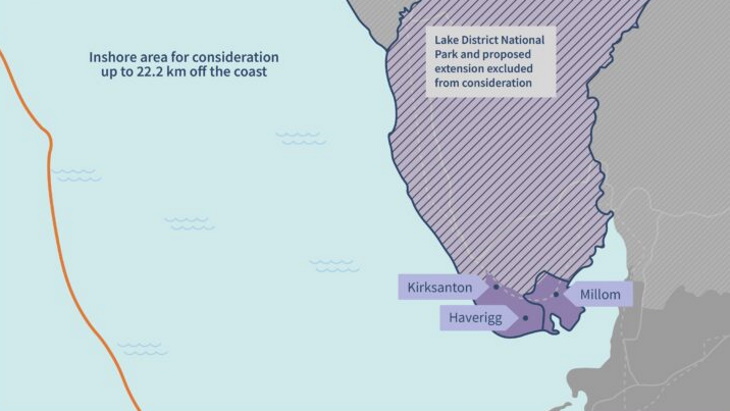As well as Copeland Borough Council and Radioactive Waste Management (RWM), initial membership of the South Copeland GDF Community Partnership also includes local councillors and the Cumbria Association of Local Councils.
South Copeland GDF Community Partnership will now focus further engagement activities in a search area covering the electoral wards of Millom and Black Combe & Scafell.
"The formation of a second Community Partnership in Copeland marks another step forward in the nationwide search to find a willing community and suitable site for a geological disposal facility for the safe and secure disposal of higher-activity radioactive waste," said RWM.
Initially, RWM will explore the potential of deep geology beyond the coast for the underground elements of a GDF, as recommended by Copeland GDF Working Group. This would mean a land-based surface facility could provide access to a disposal area in rock deep below the seabed. The Lake District National Park and proposed extension will not be considered.
Now that two Community Partnerships have formed, the Copeland Working Group comes to an end as it has fulfilled its remit to begin conversations about GDF, identify search areas and identify initial members for Community Partnerships.
Community Partnerships are longer-term groups made up of a larger number of people to consider the possibilities of hosting a GDF within the identified search areas in more detail. Progressing to the formation of Community Partnerships unlocks access to GBP1.0 million (USD1.3 million) per year investment funding for communities, per partnership, for local projects, rising to GBP2.5 million per year if deep borehole investigations to assess geology take place.
"We're delighted to see the formation of another Community Partnership in Copeland. It provides a platform to increase community engagement and trigger investment funding for projects that should really benefit the communities involved," said RWM CEO Karen Wheeler. "We look forward to continuing discussions and beginning investigations in these areas for a site that could be suitable for a GDF."
Construction of a GDF requires both a suitable site and willing community. If a suitable site is eventually found in Copeland - which could take 10-15 years - a Test of Public Support, which would give people a direct say, would be held with those living in the wards affected. Without public support the project would not go ahead.
During an earlier site selection process, two communities in Cumbria - Copeland and Allerdale - had expressed interest in hosting a repository, but the process stopped in January 2013 when the local county council voted against moving to the next stage of the process. A new search for a site was launched in December 2018.
The Allerdale GDF Working Group has identified an area for further investigation covering 320 square kilometres comprising 13 electoral wards of Allerdale Borough Council, as well as an inshore area up to 22.2 kilometres off the coast. The working group has recommended that a community partnership is formed in the borough.
A GDF comprises a network of highly-engineered underground vaults and tunnels built to permanently dispose of higher activity radioactive waste so that no harmful levels of radiation ever reach the surface environment. Countries such as Finland, Sweden, France, Canada and the USA are also pursuing this option.







_15863.jpg)







